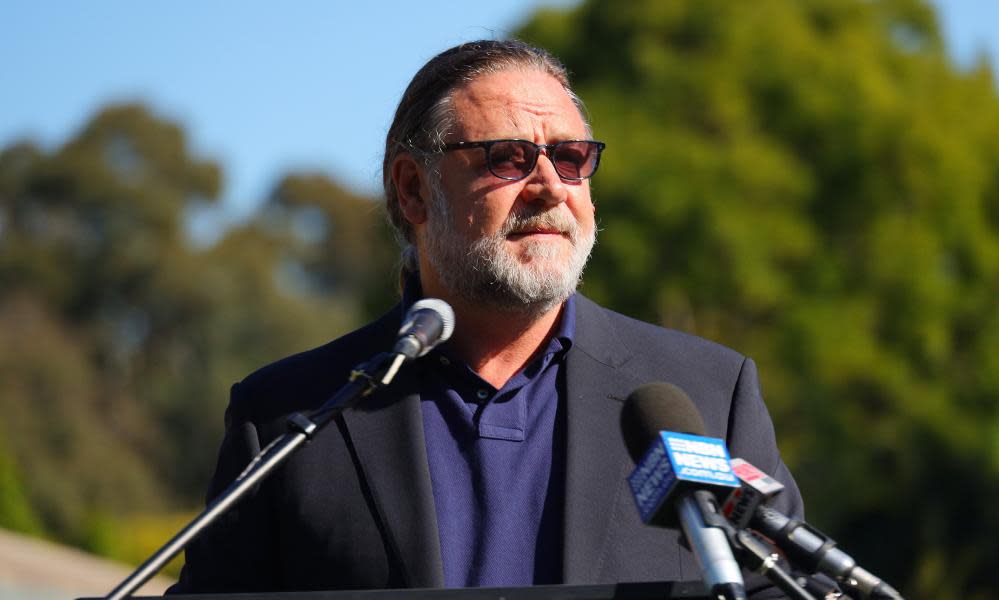Big boom for the Big Banana: Russell Crowe backs $400m film studio for Coffs Harbour

Russell Crowe’s state-of-the-art film-making facility – announced on Wednesday in Coffs Harbour, where it will be based – joins a growing list of new Australian studios: a response to both the global content boom, and the country’s success through the pandemic.
With an estimated value of $438m, the studio complex will integrate production and post-production facilities with accommodation and amenities, taking over the 40-hectare (100-acre) Pacific Bay luxury resort: an eight-minute drive from the local airport, and four minutes from Coffs Harbour’s other major destination, the Big Banana.
Crowe, who lives in the coastal city, is financially backing the project, with partners including Pacific Bay resort owner Peter Montgomery and film producer Keith Rodger.
“The opportunity to build a facility like this spreads opportunity through the community by creating jobs, but not just jobs: actual professions and careers,” the film star said on Wednesday. “For a number of years I’ve been thinking how I might be able to combine where I live and my work.”
Australia’s Hollywood moment
Dubbed the Pacific Bay Resort Studios & Village, the development joins a boom in studio construction in Australia, including the Screen Queensland Studios in the Brisbane suburb of Hemmant; the Byron Studios in Northern Rivers (where the Nicole Kidman Netflix series Nine Perfect Strangers was filmed); and the proposed $100m WA government-backed film hub on Fremantle’s Victoria Quay.
Meanwhile overseas, an old convention centre in downtown Oklahoma City has just been converted into a production facility with five sound stages; two new studios are planned for Buffalo, New York; and Netflix is expanding its studio facilities outside Madrid to cope with the rise in production in Spain.
Each of these facilities will be locked in a fierce battle to draw productions. They will each offer points of difference – the Crowe-backed studio includes accommodation that will allow stars to live on-site with their families – while tapping into an array of financial incentives from local governments.

The new Australian studios will also take the pressure off existing facilities in Sydney, Melbourne, Adelaide and on the Gold Coast, which – due in large part to Australia’s success in curbing Covid – have been booked solid for many months. A slew of the world’s biggest stars – Chris Hemsworth, Matt Damon, Tom Hanks, George Clooney, Julia Roberts, Idris Elba, Melissa McCarthy and Tilda Swinton – have been working down under, or are due to arrive.
Industry urges caution: ‘We won’t remain the favoured destination’
But while there seems be no stopping the global content boom, the other major driver of Australian-based productions – the pandemic – is receding, and some in the industry are urging caution. Upwards 60% of the population in the United States have been vaccinated, while only a small number of Australians have had the jab.
“Building studios in response to Covid is a terrible strategy because [the global crisis] is not going to be around for very long,” said former Roadshow head of production and ScreenWest CEO Seph McKenna.
“[Australia’s] slow rollout of the vaccine means that we are behind the US and the rest of the world. Without a vaccinated population – and with the ever-present threat of lockdown – we won’t remain the favoured destination of Hollywood.”
McKenna said that the biggest factor in determining whether a production heads down under remains the value of the dollar. “When the dollar rises, Hollywood looks elsewhere to spend its money. That is something that cannot be controlled. It’s why building studios has always been a boom and bust endeavour,” he said.

Kate Marks, CEO of Ausfilm – the body charged with selling Australia as a filming location – believes that the country’s success in keeping the virus at bay is not a major factor in the current boom.
“Many of the projects that have been filming in the past 12 months were already planning to come here pre-Covid,” she said. “Our Covid response has caused an uptick in production, but what we are seeing is the result of many factors, such as the quality of our crews, the stunning locations and the attractiveness of the lifestyle.”
The key driver to the current boom, according to Marks, is the federal government’s $400m top-up to the location incentive program, which was announced in July.
“[That] takes it to a 30% rebate which we believe is the level needed for Australia to remain competitive,” she said.
‘The demand is greater than our ability to service it’
The Coffs Harbour studio is a major proposal which could be seen as a threat to Australia’s other studios, which are in constant battle to lure productions.
Related: God’s Favorite Idiot: Netflix pulls out early from Melissa McCarthy’s Australian production
In a single striking package, Pacific Bay will bring together the first fully integrated feature-film production and post-production complex in Australia; the luxury lifestyle offerings of New South Wales’ largest beachfront resort; two sizeable backlots; coastal and mountain locations nearby; a film school; and a nearby airport.
But Marks sees the proliferation of studios in Australia as a welcome development.
“Of course as the post-Covid world opens up and travel becomes easier, it will be a more competitive environment. However, we expect the appetite for content to be maintained or increase, and the demand on our facilities to remain high,” she said.
“Since the announcement of the incentive [top-up] we have had $4.3bn worth of enquires through our Los Angeles office. So the demand is greater than our ability to service it. To maintain our current levels of growth we need new investments in infrastructure.”


